In Norse mythology, Tyr stands as a figure of immense significance, embodying law, justice, and heroic glory. His story is not just a tale of divine adventures, but also a reflection of ancient Norse culture. To me, Tyr (and Ullr) have always seemed to be among the most enigmatig and fascinating of the Norse gods. As a kid, I was blown away by how he was willing to loose his hand in order to keep his word.
In the world of the Vikings, I am sure he had much the same effect. He was called upon to witness oaths, and was likely depended upon to see those oaths being kept.
Tyr’s story is a blend of the mystical and the moral, portraying a deity whose actions reflect the ancient Norse people’s aspirations and fears. His tale is an exploration into the heart of Norse mythology, offering a glimpse into the ethos of a bygone era, and the stories of the gods that helped shape it.
Tyr Key Facts
| Parents | Hroðr (jötun) mother, and Odin, or Hymir (jötun) as father |
| Partners | None |
| Siblings | Thor, Baldr |
| Offspring | None |
| Old Norse name | Týr |
| Other names | Tiw, Ziu, Mars Thingsus |
| The God of | War, Law and Oaths |
| Symbols | Missing hand, Sword |
Name and Etymology
The Norse name Týr has roots deeply embedded in the linguistic traditions of the Germanic peoples. Known in Old English as Tīw, his name can be traced back to the Proto-Germanic theonym *Tīwaz, which translates to ‘God’. This ancient name has transcended through ages. Moreover, it’s even represented in the runic alphabet as the Tiwaz rune (ᛏ), corresponding to the Latin letter T. The lasting legacy has even found its way into our modern week as the namesake of Tuesday (‘Týr’s day’).
Etymology of Týr
The etymological journey of the Old Norse theonym Týr as mentioned goes back to a Proto-Norse form reconstructed as *Tīwaz. This ancient form, akin to its Germanic cognates Tīw (Old English) and *Ziu (Old High German), stems from the Proto-Germanic theonym *Tīwaz, translating to ‘God’. The story extends to a Gothic deity named *Teiws (later *Tīus), reconstructed based on the associated rune tyz. In Old Norse poetry, the plural form tívar refers to ‘the gods’, while the singular týr, translating to ‘(a) god’, finds mention in kennings for Odin and Thor. The modern rendition often sees the anglicization of Týr’s name, dropping the diacritic to render Old Norse’s Týr as Tyr.
The Proto-Germanic masculine noun *tīwaz (pl. *tīwōz) translates to ‘a god, or a deity’, likely serving as a title or epithet for a specific deity whose original name now lies in the veils of antiquity. This noun has its roots in the Proto-Indo-European *deywós, meaning ‘celestial, heavenly one’, hence a ‘god’, which further derives from *dyēus, translating to ‘diurnal sky’, hence ‘daylight-sky god’. This linguistic journey traverses through various ancient languages, finding parallels in Sanskrit (devá ‘heavenly, divine’), Old Lithuanian (deivas), and Latin (deus ‘a god, deity’). The Germanic noun *tīwaz also finds its echo in the Finnic loanword teivas, and possibly in the Romano-Germanic deity Alateivia, although the latter’s origin remains enigmatic.
While mostly lost, this does hint to the actual position Tyr likely once held as much more than just one of the gods. At one point he was a likely the leader of gods. This part of his story that we have basically lost through time is also part of his allure I think. His story is one we will never fully know.
Týr’s Origins
The origins of Týr, like many figures in Norse mythology, are shrouded in mystery and open to interpretation. The ancient texts provide varying accounts of his parentage, leading to debates and speculations among scholars and enthusiasts alike.
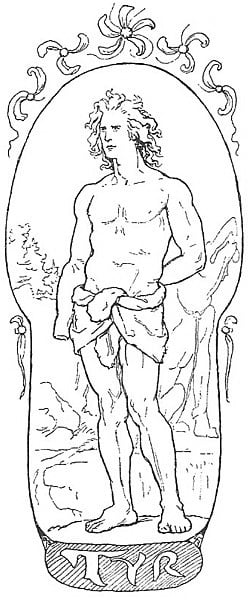
In some sagas, Týr is depicted as the son of Odin, the Allfather and chief deity of the Norse pantheon. This lineage places Týr among the Aesir, the chief tribe of gods in Norse mythology, and makes him kin to gods like Thor and Baldur. Being a son of Odin would emphasize Týr’s significance in the divine hierarchy and underscore his role as a god of law and war.
Possibly son of the Jötun Hymir
However, other sources, notably the Hymiskviða, a poem from the Poetic Edda, present a different family background. In this account, Týr is described as the son of the giant Hymir, a figure known for his immense cauldron. This lineage ties Týr closer to the jotnar, the giants often in opposition to the Aesir. The poem also mentions Hymir’s wife Hroðr as Týr’s mother, who aids Thor and Týr in their quest for the cauldron. They also encounter his grandmother in the Hymiskviða. She is described as a fearsome troll with nine hundred heads, just one of many fantastical beings in Norse myths.
The dual narratives of Týr’s parentage reflect the intricate and often contradictory nature of Norse myths. Whether a son of Odin or Hymir, Týr’s significance in the Norse pantheon remains undiminished. His narrative, intertwined with gods and giants, also points to the fluid boundaries between the Aesir and the Jotunn. Odin is half Jötun, so is his son Thor and several other Aesir gods just as an example.
Odin the Philanderer
Personally I wonder if there is a lost poem explaining the deep animosity between Tyr and Hymir in the Hymiskvida. There is no love lost between the supposed father and son. Moreover, Tyr apparently left at a young age, possibly never to return. Could Tyr be an illegitimate son of Odin, by Hymirs’ wife? He wouldn’t be the first in the Norse myths, Odin has several other children running about with another mother than Frigg.
Both Odin and his son Thor have illegitmate children who play roles in different myths, some more important than others. The point I have taken from all the philandering, and adoption of sons or daughters, is that this likely reflected Viking Age society in Scandinavia. To say they were sexually liberated would be an understatement. That they also lived in a violent time where children might suddenly be orphans is just as true.
Tyr’s Significant Relationships
Tyr, as a counterbalance to his own mixed parentage, does not have a wife or any children. His story is more focused on his divine duties and heroic exploits rather than romantic entanglements. Unlike some other Norse deities, his tale doesn’t delve much into personal relationships or love interests. His character represents a form of divine singularity, a focus on the greater good over personal desires.
Similarly, there are no mentions of him having had any children in the Norse mythological texts. His story is devoid of personal familial ties, emphasizing instead his role as a divine arbiter and a warrior. This lack of personal relationships highlights Tyr’s symbolic representation as a god of law and order.
Depiction And Characteristics
Tyr is often depicted as a noble warrior, bearing the marks of both his divine heritage and his martial prowess. He is usually shown with a sword or spear,, symbolizing his warrior aspect. Other times he is seen with his hand in the mouth of Fenrir, recounting the gods tricking the wolf into his chains. These symbols are not mere accessories but extensions of his divine persona, each telling a tale of valor, justice, and the ancient Norse ethos.
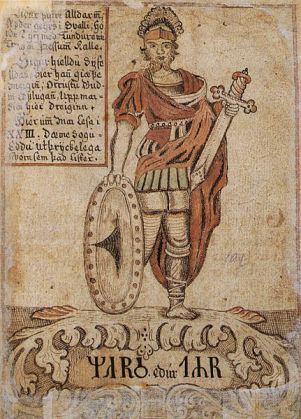
His most distinctive feature is his missing hand, a result of his oath to the fearsome wolf Fenrir. This physical attribute is a stark reminder of his courage and the sacrifices made by the gods, or him specifically, to maintain order. It’s a visual narrative that resonates with the themes of heroism and sacrifice that are central to Norse mythology.
Tyr Personality
Tyr’s personality is a reflection of his divine duties—stoic, brave, and righteous. His actions in the myths portray a deity committed to the principles of justice and law, even when faced with personal peril. His encounter with Fenrir, where he places his hand in the wolf’s mouth as a pledge of trust, showcases his courage and commitment to the greater good.
His demeanor is usually seen as calm and composed, embodying the judicial aspect of his character. Yet, his martial prowess is undeniable, making him a revered figure among the Norse warriors. His dual nature as a warrior and a judge reflects the balanced approach to justice and conflict in Norse society.
Tyr Symbols
Týr’s symbols resonate deeply with his role as a formidable warrior and a beacon of justice within the Norse pantheon. The sword, often associated with Týr, stands as a testament to his martial prowess and his readiness to defend the cosmic order. Similarly, the spear, another symbol linked with Týr, underscores his authority and unwavering commitment to justice and righteousness.
Beyond these weapons, one of the most iconic and poignant representations of Týr is his missing hand. This depiction is a direct reference to his encounter with the wolf Fenrir. In an act of unparalleled bravery and sacrifice, Týr places his hand in Fenrir’s mouth as a pledge of the gods’ sincerity, only to have it bitten off when the wolf realizes the gods’ deception. This act of sacrifice becomes emblematic of Týr’s character, symbolizing his unwavering commitment to the greater good and the challenges associated with upholding justice and order.
While Týr doesn’t have specific animals or plants emblematic of his essence like some Norse deities, his association with Fenrir is profound. This connection not only highlights Týr’s personal sacrifice but also underscores the intricate balance and often tumultuous relationship between gods and creatures in Norse mythology. Through these symbols and associations, the depth and complexity of Týr’s narrative come to the fore, painting a picture of a god whose valor, sacrifice, and sense of duty are unparalleled.
Tyr Role and Responsibility
Tyr’s primary role is as the god of honor and oaths as it extends into both war and everyday life. More specifically his responsibility is ‘the rules of war’, and as a guarantor of oaths. As the god of war, he is not broadly seen as a god who influences the outcome of battle, that is Odin and maybe Thor. However, he is the one overseeing everyone keeping their word, and more broadly fights with honor.
More than a judge or arbiter, (that is more Forseti, the god of justice’s domain) he is the god of honor and doing what is right. Break your word at your own peril, you are crossing him and he will not let it stand. His powers, thus, are a manifestation of the Norse societal and cosmic order, embodying the principles that hold the fabric of the Norse cosmos together.
Tyr’s responsibilities extend beyond the divine realm into the mortal world. His influence is seen in the societal norms and legal systems of the ancient Norse people, who looked to Tyr as a symbol of righteous authority and heroic valor. To “swear an oath on Tyr’s name” was binding and not something to break lightly.
Play Fun Norse Quiz
Is this article making you even more curious about Norse gods and goddesses? You can satisfy your curiosity by playing a fun Norse mythology quiz. This way, you can test your knowledge about Norse gods and goddesses, as well as fill in some gaps. Good luck and have fun playing!
You might be interested in this fun game too! It reveals the parentage of Tyr and other sons (and daughters) of Odin:
Don’t forget to try our other games as well!
Myths about Tyr
Tyr’s mythic narrative is rich with tales of courage, sacrifice, and divine justice. Each myth not only tells a tale of divine adventure but also imparts moral and societal lessons, reflecting the ancient Norse values and the cosmic order that governed their world.
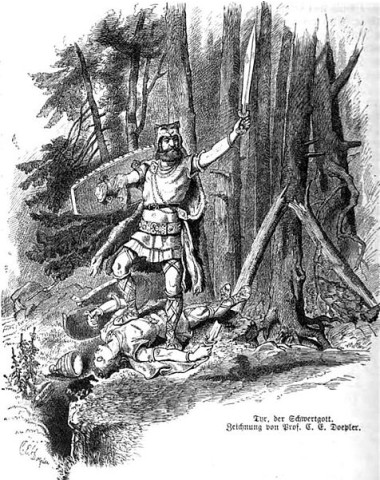
Tyr and Thor’s Quest for Aegir’s Cauldron
One of the lesser-known yet intriguing tales from Norse mythology involves a quest undertaken by Tyr and Thor to obtain a massive cauldron for the giant Aegir, so he could brew enough mead for all the gods. This adventure showcases the camaraderie and the shared sense of duty among the Norse gods, as well as their interactions with other beings in the Norse cosmos.
The tale begins with Aegir, the sea giant, inviting the gods to a feast. However, he realizes that he doesn’t have a cauldron large enough to brew mead for all the gods. It’s then suggested that Hymir, a giant and Tyr’s father, possesses such a cauldron. Tyr and Thor, driven by the promise of a grand feast and the goodwill of hosting a gathering of gods, decide to journey to the land of the giants to retrieve this colossal cauldron.
Their journey is not without challenges, as the land of the giants is a perilous place, even for gods of their stature. Yet, their determination and the camaraderie between Tyr and Thor drive them forward. This part of the tale showcases the adventurous spirit and the bond of friendship among the Norse gods, as they navigate through the challenges together.
Encountering Hymir
Upon reaching Hymir’s abode, they are met with a less than warm welcome. Hymir is known for his ill-temper and is not keen on aiding the gods. However, after some persuasion and showcasing of Thor’s immense strength, Hymir reluctantly agrees to lend them the cauldron. But the gods soon realize that the cauldron is too heavy to be carried by them alone.
The narrative takes a humorous turn as Thor, known for his immense strength, struggles with the weight of the cauldron, showcasing the whimsical and often unpredictable nature of the Norse mythological tales. Despite the challenges, the determination of Tyr and Thor shines through as they manage to transport the cauldron back to Aegir.
The Feast of Aegir
With the cauldron secured, Aegir brews the mead, and a grand feast is held. The gods revel in the camaraderie, and the tale ends with a note of celebration and a sense of shared accomplishment. The successful quest of Tyr and Thor not only ensures a grand feast for the gods but also strengthens the bond between them, showcasing the themes of friendship, adventure, and the shared sense of duty that binds the Norse gods together.
This tale, though lesser-known, is a delightful narrative that explores the adventurous spirit, the camaraderie, and the whimsical nature of the Norse mythological world. Through the quest of Tyr and Thor, we get a glimpse into the lighter and more jovial aspects of the Norse divine narrative, enriching our understanding of the complex and colorful tapestry that is Norse mythology.
The Binding of Fenrir
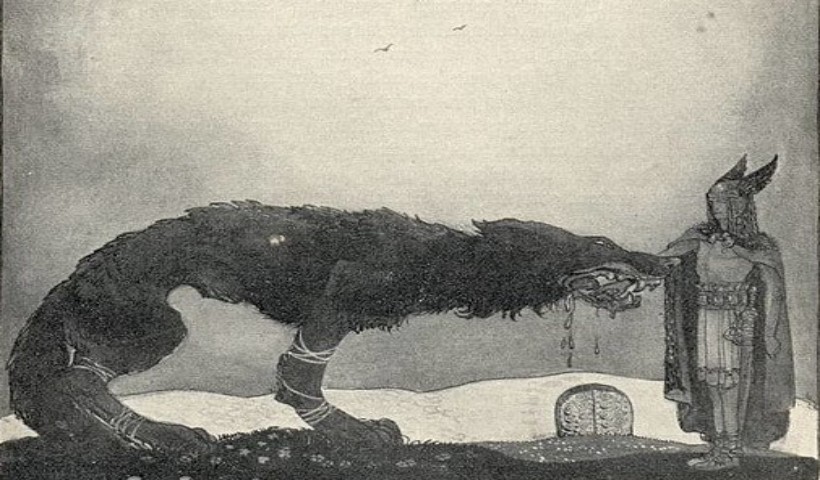
The tale of Tyr and Fenrir is one of the most iconic myths in Norse mythology, showcasing the gods’ struggle to maintain cosmic order in the face of growing chaos. Fenrir, the monstrous wolf, posed a grave threat to the gods, and it was decided to bind him to prevent the foretold destruction he would bring. This narrative is rich with themes of courage, sacrifice, and the inevitable march towards Ragnarok, the end of the world.
The Growing Threat
The gods were aware of the prophecy that Fenrir would play a significant role in Ragnarok, causing destruction and chaos. As Fenrir grew in size and strength, his menace became unbearable, and the gods decided to bind him to prevent the impending doom. However, the task was not simple, as Fenrir’s strength was immense, and he was wary of the gods’ intentions.
The gods devised a plan to bind Fenrir with a magical ribbon known as Gleipnir, crafted by the dwarves and made from six impossible things, including the sound of a cat’s footfall and the beard of a woman. This ribbon was as thin as silk but stronger than any chain. They approached Fenrir with the guise of testing his strength, challenging him to break free from Gleipnir. Fenrir, however, was suspicious and demanded a show of good faith from the gods.
Tyr’s Sacrifice
Tyr, showcasing his courage and commitment to the greater good, volunteered to place his hand in Fenrir’s mouth as a pledge of trust. This act was a testament to Tyr’s bravery, as he was well aware of the risk involved. The other gods then bound Fenrir with Gleipnir, and as the wolf realized the deception, he bit off Tyr’s hand, fulfilling the pledge in a gruesome manner.
His sacrifice was not in vain, as Fenrir’s binding provided a temporary respite from the foretold events of Ragnarok. However, it also signified the inevitable march towards the end of the world. Seeing as Fenrir’s binding was prophesied to last only until Ragnarok. Tyr’s loss of his hand was a physical and symbolic sacrifice. It was embodying the gods’ struggle to maintain cosmic order in the face of impending chaos.
The Legacy of the Tale
The tale reflects the ancient Norse belief in a preordained fate, as despite the gods’ efforts, the prophecy of Ragnarok loomed large. However, the gods, with Tyr at the forefront, continued to uphold the cosmic order. Forever trying to dispel the inevitable end prophesied for them all.
Tyr fights til the end with Garmr
And in the end, at Ragnarok, Tyr will arm himself with Tyrfing and stride to the battlefield. There, he will clash with the terrible guardian of Hel’s gate, Garmr, the bloodstained hound (or wolf) of the underworld. Their fight will be dreadful and they shall both kill each other. And that is how Tyr, the compelling god of law and war will die.
Tyr on old Artifacts and Similar
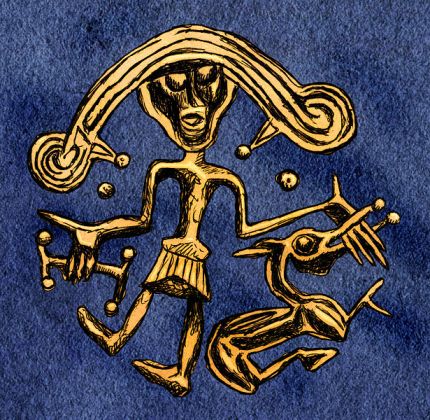
Tyr’s representation in art is as varied as his narrative, showcasing different aspects of his character and his divine duties. From ancient carvings and runestones to modern illustrations, Tyr’s depiction has evolved over time, reflecting the changing perceptions and interpretations of his narrative.
One of the most iconic representations of Tyr are depictions of his encounter with Fenrir, immortalizing his courage and sacrifice. This scene is not just a visual narrative but a symbolic representation of the Norse ethos. Embodying the themes of heroism, sacrifice, and the struggle to maintain cosmic order.
Mentions in Ancient Texts
Tyr’s narrative is documented in various ancient texts, offering a glimpse into his character and role in Norse mythology. These texts, written in different periods and by different authors, offer a rich and multi-dimensional portrayal of Tyr. Enriching our understanding of both this Norse deity and the ancient Norse mythological tradition.
The Poetic Edda
The Poetic Edda, a collection of Old Norse poems dating back to the 13th century, is a primary source of information about Tyr and other Norse deities. Although the authorship of the Poetic Edda is unknown, it remains a crucial text for understanding Norse mythology.
Hymiskviða
The Hymiskviða, from the Poetic Edda, shares of Tyr and Thor’s adventure to obtain a cauldron from the giant Hymir. This poem not only highlights Tyr’s valor but also provides a glimpse into the camaraderie among the Norse gods. Moreover, this establish Tyr as having Jötun parents, in opposition to him being Odin’s son.
Lokasaenna
One notable mention of Tyr is in the Lokasenna. It is a poem of the Poetic Edda where Loki accuses the gods of various misdeeds. In response to Loki’s taunts, Tyr shows his righteous character, defending the gods and upholding the principles of honor. A quote from this section reads:
“Tyr, be silent; never couldst thou Settle strife ‘twixt any two; Missing a hand, thou must feel the lack Of even a wife, thou wretched wight!”
The Prose Edda
The Prose Edda, written by Snorri Sturluson in the early 13th century, is another significant source of Norse mythological tales. Snorri Sturluson was an Icelandic historian, politician, and poet who played a crucial role in documenting Norse myths and legends.
In the Prose Edda, Tyr’s courage and martial prowess are highlighted, especially in the tale of the binding of Fenrir. A quote from the Prose Edda describing Tyr’s bravery reads:
“Then they all looked to one another and found that he alone dared to lay his hand in the wolf’s mouth.”
Gylfaginning
Gylfaginning, a part of Snorri Sturluson’s Prose Edda, also mentions Tyr. In this story, the cosmology of the Norse world and the tales of the gods are recounted to King Gylfi. Tyr’s role as a god of law and war is highlighted, showcasing his significance in the Norse divine hierarchy.
FAQs
Tyr is known as the Norse god of war and honor, specifically when it comes to keeping an oath. He is embodying the principles of justice, righteous authority, and martial valor.
Tyr is often depicted as a noble warrior with a sword, missing one hand. It symbolizes his martial prowess and bravery.
Tyr’s encounter with Fenrir showcases his courage and commitment to maintaining cosmic order. He placed his hand in Fenrir’s mouth as a pledge of trust, and lost it when the wolf was trapped. It is a recurring theme of heroism, sacrifice, and the struggle against chaos inherent in Norse mythology.
Tyr is a son of Odin, the chief deity in the Norse pantheon, and a sibling to Thor and Baldr. His narrative is intertwined with other Norse deities, reflecting the interconnectedness of the Norse divine cosmos.
Tyr’s representation in art varies, showcasing different aspects of his character. His encounter with Fenrir is a common theme, symbolizing his courage and sacrifice.
Featured Image Credit: John Bauer, Public domain, via Wikimedia Commons
